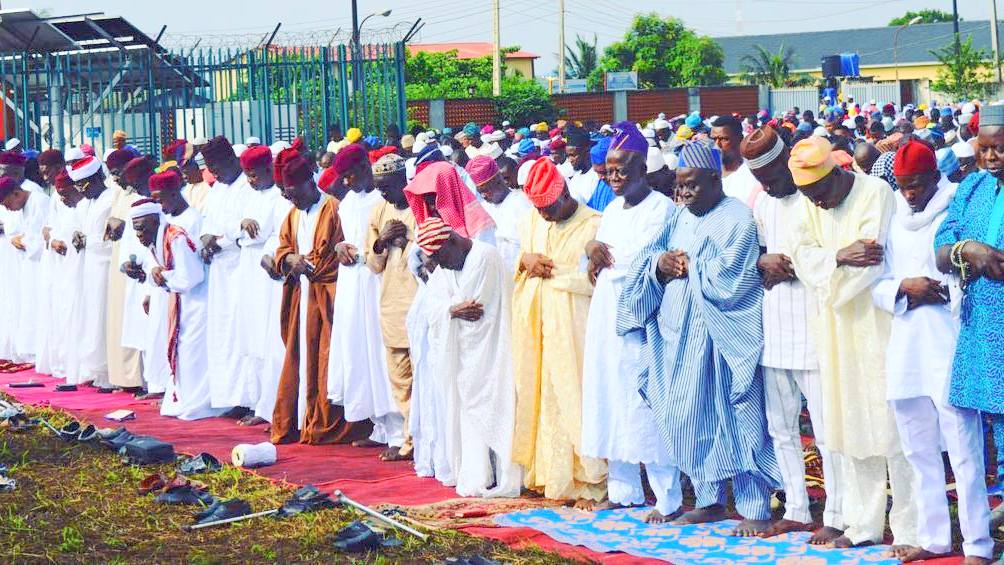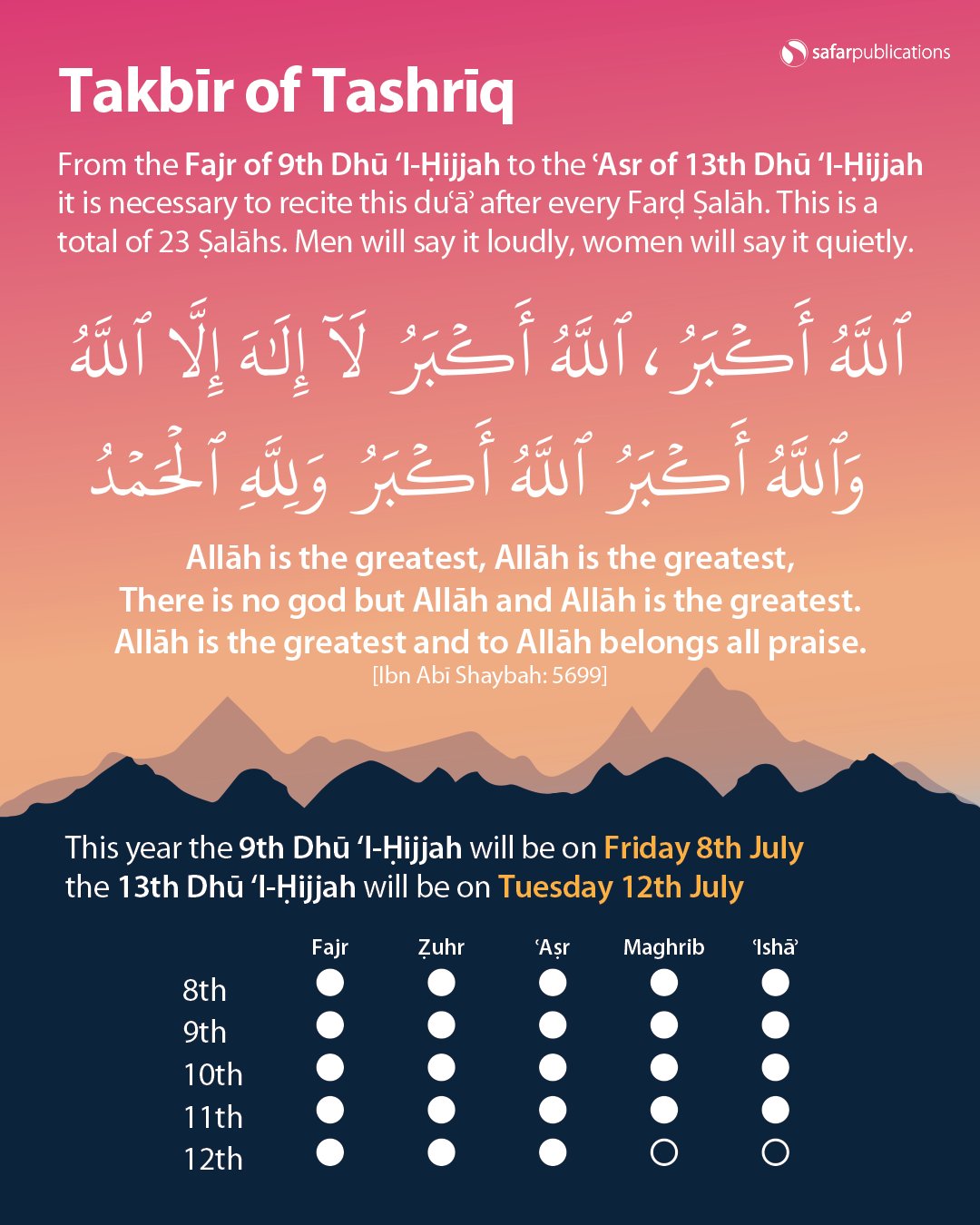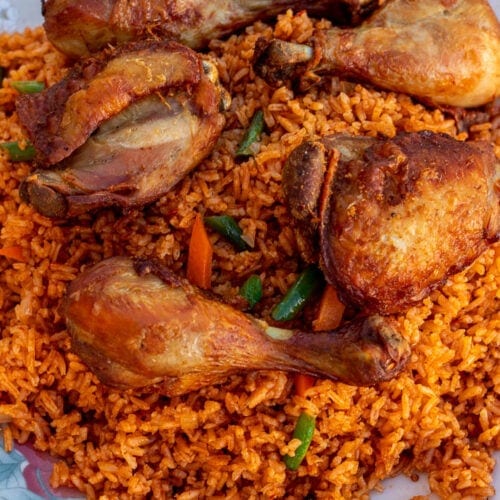It’s ‘Eid, Yaaaay!!!

All praise and adoration is due to Allah, and may His peace and blessings be upon the noblest of mankind – Muhammad Ibn AbduLlaah (SallaLlaahu ‘alayhi wa salam), his household, companions, and those who thread his path till the day of recompense. Aameen.
It is the Day of ‘Eid just as the Prophet (salallāhu ‘alaihi wasallam) said:
إِنَّ يَوْمَ عَرَفَةَ وَيَوْمَ النَّحْرِ وَأَيَّامَ التَّشْرِيقِ عِيدُنَا أَهْلَ الإِسْلاَمِ وَهِيَ أَيَّامُ أَكْلٍ وَشُرْبٍ
“The day of Arafat, the day of sacrifice, and the days of Tashriq are our ‘Eid, O people of Islam, and they are days of eating and drinking and the remembrance (dhikr) of Allah.” (Muslim, Abu Dawūd, An-Nasā’ī, Ahmad and declared saheeh by Al-Albāni, Saheeh Al-Jāmi’, no. 2689)
Let us quickly go through some essential points about ‘Eid and recommended sunnahs to perform.
- How Many Raka’ahs do we pray?
The ‘Eid Prayer consists of two rak’ahs before the khutbah is delivered due to the saying of AbduLlaah Ibn ‘Umar (radiyaLlāhu ‘anhumā): “The Messenger of Allah (SallaLlaahu ‘alayhi wa sallam), Abu Bakr, ‘Umar and ‘Uthmān(radiyaLlaahu ‘anhum) would pray the ‘Eid Prayer before the khutbah.” (Bukhāri and Muslim) And this was the Sunnah practiced by the generality people of knowledge. The rationale in waiting for the khutbah till after the prayer in the ‘Eid prayers but doing it before the prayer on Jumu’ah is that the khutbah is a pre-condition for the Jumu’ah prayer, and a pre-condition always precedes its action. This is not the case for ‘Eid because the khutbah here is Sunnah. - Do we say the Adhan or Iqamah?
No prizes for guessing correctly – The adhān and iqāmah is not legislated in the Sharī’ah for the ‘Eid prayers. Imaam Muslim reported in his Sahīh from Jābir ibn AbduLlaah (radiyaLlāhu ‘anhu): “I prayed ‘Eid with the Prophet (صلى الله عليه وسلم) more than just once or twice and he began with the prayer before the khutbah without an adhān or an iqāmah.” - Do we Observe Nawafil before or after the ‘Eid Prayer?
There is no nawafil or Sunnah prayer to be prayed before the ‘Eid prayer or after it until one has left the (the prayer area) due to the saying of AbduLlaah Ibn ‘Abbās (radiyallāhu ‘anhumā): “The Prophet (SallaLlaahu ‘alayhi wa sallam) came out on the day of ‘Eid and prayed two rak’ahs (‘Eid prayer) and he did not pray anything before it or after it.” (Bukhāri and Muslim). However, once a person returns to his home, the is no harm if he prays. - How many Takbirs are said in the ‘Eid Prayer?
‘A’ishah (radiyaLlāhu anhā) said: “In both Fitr and Adhā prayers, Allah’s Messenger would make seven takbīrs in the first rak’ah and five in the second ―and these were other than the ones for entering into rukū’.” (Abu Dawūd, no. 1149, authenticated by Al-Albāni).
N:B – The Opening Takbir is a pillar of the prayer, and as such MUST not be left out, intentionally or otherwise, as the prayer is not valid until it is said. The rest of the takbīrs are Sunnah, not obligatory, so if one meets the Imaam on ruku’ for example, he has to say the opening takbir, and then the takbir to go into ruku’, leaving off the additional takbirs as they are sunnah. - What if I miss the ‘Eid Prayer?
It is from the Sunnah for the one who missed the congregation of ‘Eid prayer or that he missed some of it to make up what he missed ―and, he should pray it in the manner that the ‘Eid prayer is normally performed. So, he should pray two rak’ahs with the additional takbīrs as in the ‘Eid prayer. So, therefore, If you missed the prayer altogether and arrive while the imām is delivering the khutbah, then sit and listen to him. After he finishes, observe your two rak’ahs for the ‘Eid prayer. There is no harm if you pray on your own or in jamā’ah with a few who missed the prayer and arrived late. - Women must attend the ‘Eid Prayer too
Al-Bukhāri (no. 971) reported from Umm ‘Atiyyah (radiyaLlāhu anhā): “We were commanded to come out on the day of ‘Eid and to bring out the virgin girls from their houses and menstruating women so that they might stand behind the men and say takbīr along with them and supplicate to Allah along with them and hope for the blessings of that day and for purification from sins.”
She (radiyaLlāhu ‘anhā) also said: “Allah’s Messenger would order the virgins, the mature women, the secluded and the menstruating women to go out for the two ‘Eids. As for the menstruating women, they were to stay away from the musallā (i.e. from the prayer) and participate in the Muslims supplications.” One of them said: “O Messenger of Allah! What if she does not have a jilbāb?” He said: “Then let her sister lend her a jilbāb.” (Tirmidhi, no. 539)
Important Sunnahs on ‘Eid
- Prepare yourself for the ‘Eid Prayer by taking Ghusl and wearing your best clothes
Imām Mālik reported in Al-Muwatta from Nāfi’: “Ibn ‘Umar (radiyaLlāhu ‘anhumā) would take a bath on the day of ‘Eid Al-Fitr before leaving out to the place of prayer.” Furthermore, Ibn Qayyim Ibn Al-Qayyim stated: “It is established from Ibn ‘Umar, alongside the fact that was ardent in clinging to the Sunnah, that he would take a bath on the day of ‘Eid before leaving his home.”
Ibn Hajr said: “Ibn Abi Dunya and Al-Bayhaqi narrated with an authentic chain of narration to Ibn ‘Umar that he would wear his best clothes on the two ‘Eids.” (Fat’hul-Bāri 2/51) The scholars take from these narrations that it is recommended to take a bath and wear the finest clothes for the days of ‘Eid. - It is from the Sunnah to abstain from eating before the ‘Eid Prayer
From the Sunnah of ‘Eid Al-Adhā is not to eat until after the prayer. Buraidah (radiyallāhu ‘anhu) said: “The Prophet (salallāhu ‘alaihi wasallam) would not leave home on the day of Fitr until he had eaten and he would not eat on the day of Adhā until he had prayed.” (Reported by Ahmad and others). - The Takbirs of ‘Eid
Nāfi’ said: “Ibn ‘Umar would leave the home on the day of Fitr and Adhā and would say the takbīr out aloud until he reached the place of prayer. Then he would make the takbīrs until the imām arrived. He would make takbīr with his takbīr.” (Reported by Ad-Dāruqutni and others with a sāhih chain of narration).
Men should raise their voices reciting this dhikr in the marketplaces, mosques and homes, but women should not raise their voices. It is from the Sunnah to sit near the imām who leads the prayer and delivers the khutbah and there is a virtue in waiting for the prayer to begin.
Allaahu akbar, Allaahu akbar, Allaahu akbar, laa ilaaha ill-Allaah, Allaahu akbar, Allaahu akbar, Allaahu akbar, wa Lillaahi’l-hamd (Allaah is Most Great, Allaah is Most Great, Allaah is Most Great, there is no god except Allaah, Allaah is Most Great, Allaah is Most Great , Allaah is Most Great, and all praise be to Allaah).
- Take a different route home from the one you take to reach the prayer ground
Jābir (radiyallāhu ‘anhu) said: “The Prophet (صلى الله عليه وسلم) would take different routes on the day of ‘Eid.” (Al-Bukhāri) - Exchange greetings with one another
There is no harm in the people greeting each other with the words: تقبل الله منا ومنك (Taqabal allāhu minnā wa mink) meaning: “May Allah accept it from us and from you.” Shaikh Al-Islām Ibn Taymiyyah stated: “It has been narrated from a group of the Sahābah that they would say these words and the scholars such as Ahmad and others allowed it.” And the intent of this greeting is to express affection and manifest one’s happiness. - ‘Eid is a day of Joy and Merriment

Anas (may Allah be pleased with him) stated that when the Prophet (SallaLlaahu ‘alayhi wa sallam) migrated to Madinah, he saw that the people celebrated two specific days annually. So the Prophet asked, “What are these two days?” They informed him that these were days of celebration of festivals fro the era of jāhiliyyah. So he said: “Indeed Allah has replaced these days with days better than them: the Day of Adhā and the Day of Fitr.” (Abu Dāwūd, no. 1134)
On a final note, it is important to understand that, while we bask in the euphoria of ‘Eid, we should also remember that ‘Eid in itself is ‘Ibaadah, hence it shouldn’t be ruined with sins from our excesses.
May Allah accept it from us, keep us steadfast and make us from amongst those who would witness more ‘Eids in this world. Aameen.
‘Eid Mubarak
